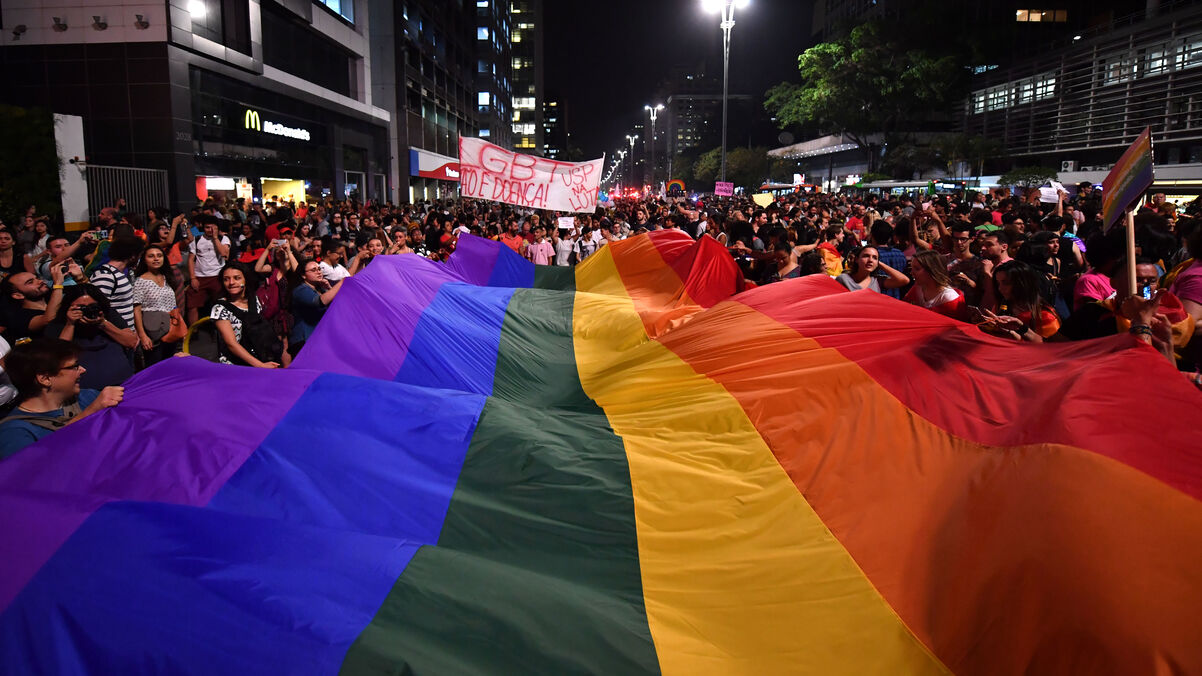Some of you might have parents who don’t accept you for who you are or colleagues who insist on those jokes that remind you of high schoolthe ones that made you feel so inadequate back then. You might live in places where anything other than straight is seen as weird or unacceptable. Or maybe you live in a country where some people consider being gay a disease.
And while this seems to be becoming less of a reality in many places around the world, in Brazil…it’s only growing.
Last week, a controversial court decision made it legally possible for psychologists to provide therapies of sexual reversion, popularly known as the “gay cure.” In other words, professionals are no longer prevented from using methods that might treat homosexuality as a mental deviation.
The resolution of the Federal Council of Psychology, which prohibits its practice since 1999 in the country, was not exactly overturned. Waldemar Cláudio de Carvalho, the judge involved in this determination, emphasizes that homosexuality is not a pathology. In the document, he adopts the World Health Organization’s statement, which says, “homosexual behavior is a widely prevalent aspect of human sexuality.”
Nevertheless, his move gives psychologists the right to treat their patients as they prefer, without any supervision. The main contradiction comes with the argument, mostly manifested by homophobic comments on the internet, that treatment is not mandatoryit’s available for those who “want to be cured.”
Apart from prejudiced remarks, when the typical Brazilian millennial goes online and decides to throw his two cents on any topic, it’s not unusual to expect that he’ll use memes, mockery, and sarcasm lots of it.
For a big part of the community, it became a joke: some said they would take the day off “for waking up ‘with gayness,’” while others mentioned being eligible for disability retirement since they suffer from being irreparably gay and fabulous. Sarcasm itself doesn’t solve things, so a protest with the hashtag #homofobiaédoença [homophobia is the disease, in free translation] quickly went viral as well.
It sure sounds like a trivial way of handling things. We end up developing a very thick skin to bear issues that should have been buried in the last century. If not for this, I can relate to all other aspects that push us back from who we really are. They succeeded at making me afraid of being comfortable with my own identity. Am I normal? Is it just a phase? Am I worthy of love?
My parents know me, but they don’t know this one side of me. Most of my friends have no idea either. And I never even had the courage to said it out loud, not even to myself, that I’m a bisexual man.
For any LGBTQ person living with shame or fear, it’s the message carried by the court decision that affects us most deeply. They are deliberate attempts to diminish social inclusion. Having a treatment for sexual reversion at hand is another way to disregard prejudice and reinforce homosexuality as an unnatural trait. In this scenario, younger ones could be encouraged to seek treatment. And as we fight our own internal battles, public institutions fail to give us recognition.
Acceptance can still be found around here. Soap operas, a significant part of national culture, do their best to portray LGBTQ characters. This year, Gloria Perez’s ‘A Força do Querer’ [The Force of Will, in free translation] brought transsexuality up for discussion with one main character and the inclusion of at least two transexual actors in the cast.
It’s impossible not to mention São Paulo’s LGBTQ Pride Parade, one of the largest in the world. This year, on a very hot Sunday, about three million people took the streets to attend the celebrations. For the first time there, trying to stand up on a trembling truck, people showed me spontaneity like never before.
But the anti-LGBTQ violence still rises at an alarming rate. According to the gay rights organization Grupo Gay da Bahia, Brazil has the highest number of homicides of LGBTQ peopleabout 340 in 2016.
So I’ve been one of those who hide. Maybe if I were younger, or if I had an intolerant family, now I’d be encouraged to seek treatment. When you’re young, not so sure about life, and uncertain of how to love yourself, you may actually end up wondering if you are not sick.
It’s beyond me to understand why a country so diverse, with its population based on miscegenation, could still go through this level of moral setback. But suppressing who I am for all this time has been enough to teach me what the real illness is. I’ve become numb for a while, but as a journalist, there are no ways of passively translating these events. A voice that speaks louder than ignorance is what I hope to be my way out. Having someone to tell you about life as it isand warn you of a disease called homophobiacould be yours.
Help make sure LGBTQ+ stories are being told...
We can't rely on mainstream media to tell our stories. That's why we don't lock our articles behind a paywall. Will you support our mission with a contribution today?
Cancel anytime · Proudly LGBTQ+ owned and operated
Read More in Culture
The Latest on INTO
Subscribe to get a twice-weekly dose of queer news, updates, and insights from the INTO team.
in Your Inbox














